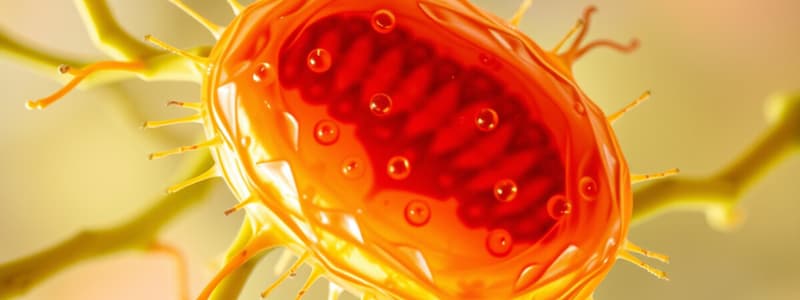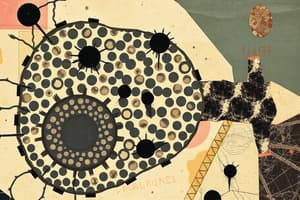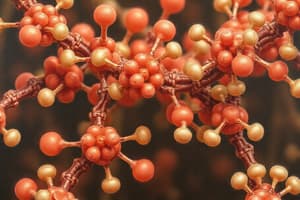Podcast
Questions and Answers
What is a cell?
What is a cell?
- A storage sac within a cell
- An organelle that converts sunlight into energy
- The basic unit of life that makes up all living things (correct)
- A tiny infectious agent
What is a virus?
What is a virus?
A tiny infectious agent that can only replicate inside the living cells of an organism.
Bacteria are multi-celled organisms.
Bacteria are multi-celled organisms.
False (B)
What is a theory in scientific terms?
What is a theory in scientific terms?
What does it mean to reproduce?
What does it mean to reproduce?
Eukaryotic cells do not have a nucleus.
Eukaryotic cells do not have a nucleus.
What characterizes prokaryotic cells?
What characterizes prokaryotic cells?
Unicellular organisms are made up of more than one cell.
Unicellular organisms are made up of more than one cell.
What are multicellular organisms?
What are multicellular organisms?
What is the nucleus of a cell?
What is the nucleus of a cell?
What is the function of a membrane in cells?
What is the function of a membrane in cells?
What is a vacuole?
What is a vacuole?
What is the role of chloroplasts in plant cells?
What is the role of chloroplasts in plant cells?
What are mitochondria known as?
What are mitochondria known as?
What does DNA stand for?
What does DNA stand for?
Flashcards are hidden until you start studying
Study Notes
Key Biological Terms and Definitions
- Cell: Fundamental unit of life, forming the basis of all living organisms; encompasses various functions essential for life.
- Virus: Microscopic infectious agent dependent on host cells for replication; lacks cellular structure and cannot reproduce independently.
- Bacteria: Diverse group of unicellular organisms; some species are beneficial (e.g., gut bacteria), while others can lead to illness.
- Theory: A comprehensive and well-substantiated explanation of natural phenomena, formulated based on rigorous evidence and observations.
Cellular Organization
- Reproduce: Essential biological process by which organisms produce offspring, maintaining the continuity of species.
- Eukaryotic Cells: Characterized by a defined nucleus and complex organelles; generally larger than prokaryotic cells and found in animals, plants, fungi, and protists.
- Prokaryotic Cells: Simplistic, single-celled organisms lacking a nucleus and membrane-bound organelles; include bacteria and archaea.
- Unicellular Organisms: Comprised of a single cell; examples include bacteria and some protists.
- Multicellular Organisms: Composed of multiple cells that work collaboratively; examples include plants and animals.
Cell Structure and Function
- Nucleus: Central organelle housing genetic material (DNA) that orchestrates cellular activities, including growth and reproduction.
- Membrane: Protective lipid layer that encircles the cell, regulating the movement of substances in and out, maintaining homeostasis.
- Vacuole: Storage structure within cells, utilized for holding a variety of substances like nutrients, waste, and water.
- Chloroplast: Specialized organelle in plant cells enabling photosynthesis; converts solar energy into chemical energy (glucose).
- Mitochondria: Key organelles known as the cell's powerhouses; responsible for energy production through respiration and metabolism.
- DNA: Molecule crucial for life, containing hereditary instructions that guide the development, functioning, and reproduction of organisms.
Studying That Suits You
Use AI to generate personalized quizzes and flashcards to suit your learning preferences.




